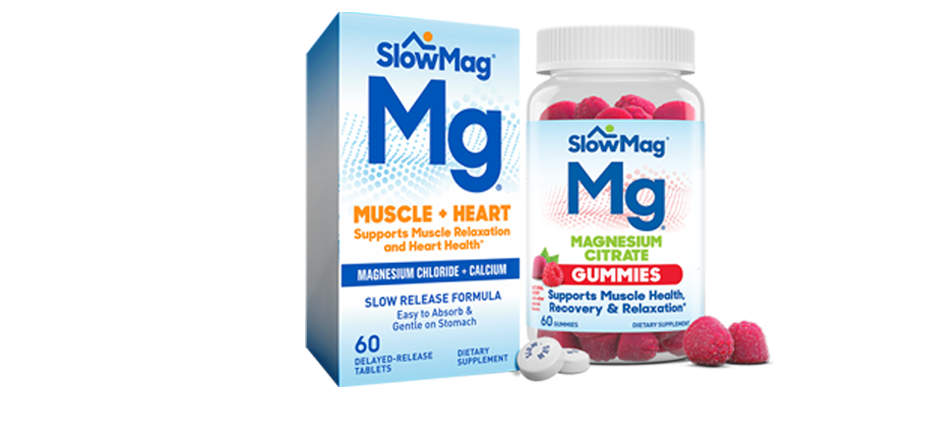Magnesium matters. Here’s why:
- Half of Americans are below the Dietary Reference Intake for Magnesium, according to the National Health and Nutrition Examination Survey (NHANES) 2007-20101
- Sufficient magnesium intake is important in helping to*:
- maintain the function of the heart, muscles, and nervous system
- support healthy sleep quality and promote a feeling of calm
- absorb and utilize vitamin D and calcium properly
- Magnesium is also critical for athletes’ endurance in order to help maintain electrolyte and energy levels*. To learn more about the impact of adequate magnesium intake among athletes, click here.
- Older adults with certain health concerns or who are taking medication may need magnesium supplementation. Magnesium can be found in foods such as green and leafy vegetables, halibut, nuts, such as almonds, and sunflower seeds and in a high-quality dietary supplement such as SlowMag Mg.2-12 To see what your Reference Daily Intake (RDI) of Magnesium is, click here.13

There’s Magnesium, and then there’s SlowMag® Mg.
The difference is in the details.
SlowMag® Mg Muscle + Heart tablets are formulated to be absorbed slowly, with a special coating to help reduce the chance of an upset stomach.
References:
1. https://ods.od.nih.gov/factsheets/Magnesium-HealthProfessional/#en22
2. U.S. Department of Agriculture, Agricultural Research Service. Usual Nutrient Intake from Food and Beverages, by Gender and Age, What We Eat in America, NHANES 2013-2016
3. Maher TJ. Medications, alcohol consumption and magnesium: ensuring adequate intake of oral magnesium. The Magnesium Report Clinical, Research, and Laboratory News for Cardiologists. Second Quarter 2000. Available at: https://www.mgwater.com/adequate.shtml Accessed 12/20/21.
4. National Institutes of Health, Office of Dietary Supplements. Available at: https://ods.od.nih.gov/factsheets/Magnesium-HealthProfessional/. Accessed 12/8/24.
5. Dipalma JR. Magnesium Replacement Therapy. Am Fam Physician. 1990;42(1):173-176.
6. Martin KJ, Gonzalez EA, Slatopolsky E. Clinical consequences and management of hypomagnesemia. J Am Soc Nephrol. 2009;20(11):2291-2295.
7. Cundy T, Mackay J. Proton pump inhibitors and severe hypomagnesaemia. Curr Opin Gastroenterol. 2011;27:180-185.
8. O’Neill LW, Culpepper BL, Galdo JA. Long-term consequences of chronic proton pump inhibitor use. US Pharm. 2011;27:180-185.
9. US Department of Health and Human Services, Drug Safety Communication. FDA Drug Safety Communication: Low magnesium levels can be associated with long-term use of proton pump inhibitor drugs (PPIs). 03 March 2011; Available at: https://www.fda.gov/drugs/drugsafety/ucm245011.htm. Accessed 12/20/21.
10. Izzedine H, Bahleda R, Khayat D, et al. Electrolyte disorders related to EGFR-targeted drugs. Crit Rev Oncol Hematol. 2010; 73(3): 213-219.
11. Saif MW. Management of hypomagnesemia in cancer patients receiving chemotherapy. J Support Oncol. 2008;6: 243-248.
12. Atsmon J, Dolev E. Drug-induced hypomagnesaemia. Drug Saf.2005;28(9):763-788.
13. https://www.fda.gov/downloads/Food/GuidanceRegulation/GuidanceDocumentsRegulatoryInformation/LabelingNutrition/UCM513817.pdf